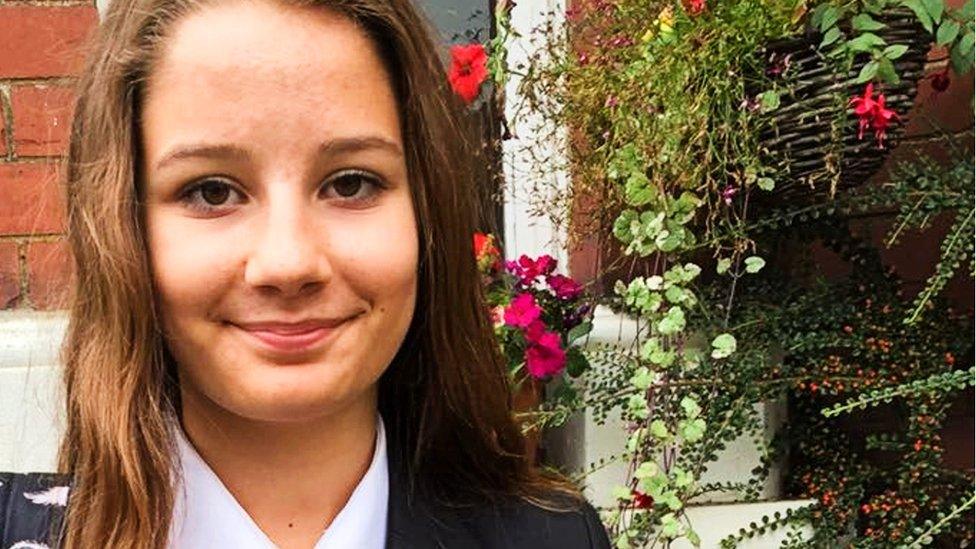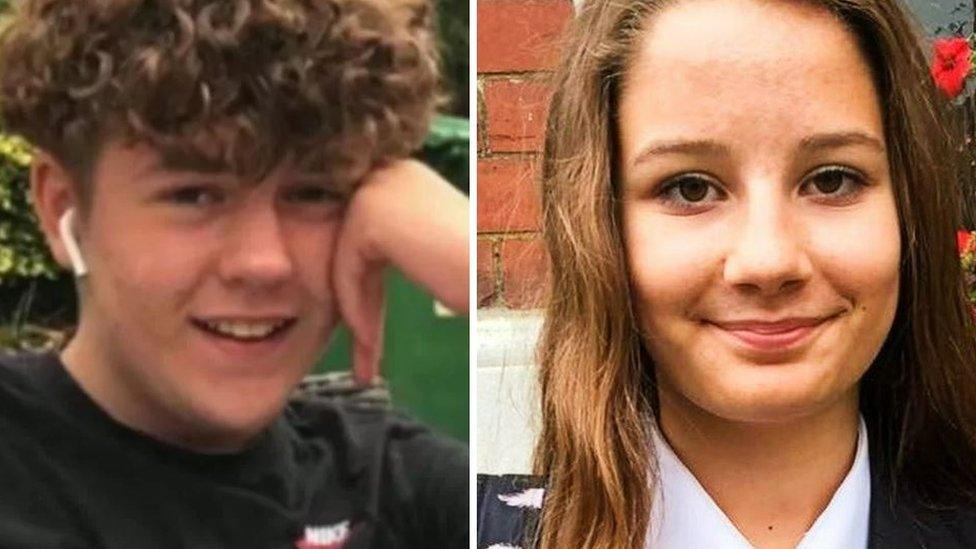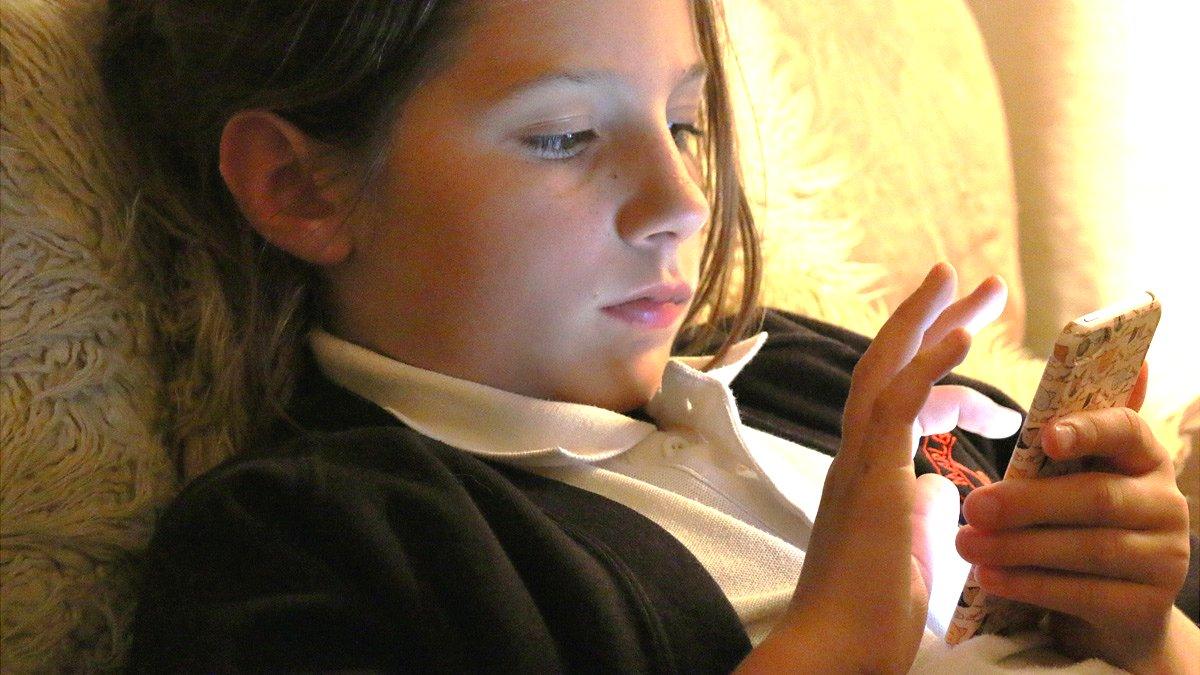Encouraging self-harm to be criminalised in Online Safety Bill
- Published

Molly Russell was aged 14 when she died in 2017 after viewing suicide and self-harm content
The encouragement of self-harm will be criminalised in an update to the Online Safety Bill, the government has said.
Content that encourages someone to harm themselves will be targeted in a new offence, making it illegal.
The government said the changes had been influenced by the case of Molly Russell - the 14-year-old who ended her life in November 2017.
Culture Secretary Michelle Donelan said she was strengthening the bill "to make sure these vile acts are stamped out".
"I am determined that the abhorrent trolls encouraging the young and vulnerable to self-harm are brought to justice," she said.
Molly Russell, from Harrow in north-west London, took her own life after viewing suicide and self-harm content on Instagram and Pinterest.
Her father has previously criticised delays to the Online Safety Bill and called for online platforms to stop self-regulating their content.
At the inquest in September, the coroner concluded the schoolgirl died while suffering from the "negative effects of online content".
In October, Coroner Andrew Walker wrote to social media firms and the government to call for changes, including separate platforms for adults and children.
Ms Donelan said social media firms could no longer be "silent bystanders" and they would face fines for "allowing this abusive and destructive behaviour to continue".
She said the update to the Online Safety Bill would create a new offence, bringing self-harm content in line with communications that encourage suicide - which is already illegal.
The amendment would mean social media platforms would be required to remove self-harm content and any person found to have posted such content would face prosecution.
More details about the maximum penalty would be published in due course, the government said.
The NSPCC's Richard Collard said it was "good news" the government was recognising the dangers of children being exposed to online content promoting self-harm.
But he said a "culture of compliance and accountability" from technology firms that have allowed this type of content "to spread like wild fire" was needed.
'Callous and reckless'
Amanda Stephens, whose son Olly was stabbed to death in Reading in 2021 by teenagers who plotted his killing across numerous social media platforms, called the amendment to the Online Safety Bill "positive news".
"Just because something's hard, shouldn't mean that it stops us wanting to push forward," said Ms Stephens.
"At the end of the day, our children are losing their lives; we're losing them from our lives. It's wrong - and we need to, as quickly as possible, but in the best possible way - move forward and I can't stress how strongly I feel about this."
The bill is due to return to Parliament in early December, following a number of delays.
The digital department said it could not say when the amendments would be tabled.
Earlier this week the government announced other new offences being added to the bill that would crack down on the sharing of intimate images without consent.
Representatives from both Pinterest and Meta, Instagram's parent company, gave evidence during Molly Russell's inquest.
Meta executive Elizabeth Lagone said she believed posts seen by Molly, which her family say "encourage" suicide, were safe, but the firm agreed that regulation was needed.
Judson Hoffman of Pinterest told the inquest the site was "not safe" when the school girl was using it. The company said it was "committed" to making ongoing improvements to help ensure the platform is "safe for everyone".
Deputy Prime Minister and Justice Secretary Dominic Raab said "lives and families" had been destroyed by "those who encourage vulnerable internet users to self-harm".
"Our changes will ensure the full force of the law applies to those callous and reckless individuals who try to manipulate the vulnerable online in this way," Mr Raab said.


This measure should come as no real surprise - it was proposed by a parliamentary committee in December 2021.
And there are obvious questions about how effective it will be. Are police going to prosecute a distressed child for posting pictures of their own self-harm scars? Does this clause weigh the law disproportionately against the individual rather than the platforms?
Might this particular clause have helped Molly? It's hard to know. Coroner Andrew Walker concluded that Molly was likely affected by the dark and depressing content and that some posts "romanticised" acts of self-harm.
The Molly Rose Foundation - set up in her memory - today said it "appears a significant move".
But I spoke to Molly's father Ian last week about the progress of the Online Safety Bill. He said years of campaigning "have led me to not believe in anyone's words but instead judge them by their actions, because it's only when a positive step is taken will I believe it".
It would have been Molly's birthday today. She would have been 20 years old.
- Published23 November 2022

- Published14 October 2022

- Published7 October 2022

- Published30 September 2022
